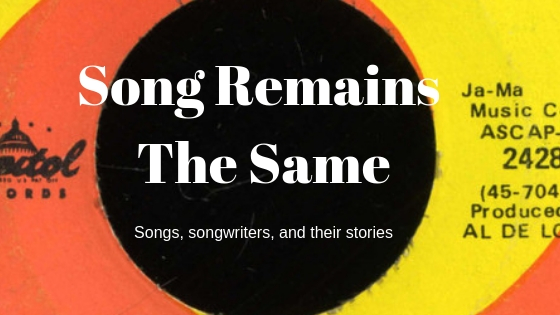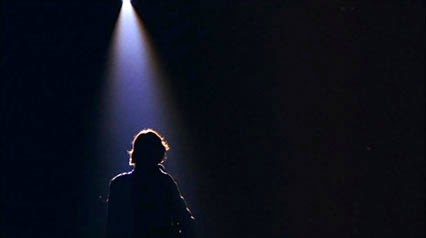
by Marshall Bowden
“Stage Fright,” the title track from The Band’s third album, is a greatest hit, a song they performed live throughout the remainder of their career as a group, yet the album is often cited as a definite step down from the first two and a sign that the group was beginning to fracture as the task of songwriting moved from a collaborative effort to mostly the work of guitarist Robbie Robertson.

“Stage Fright” is about a heightened state of anxiety…anxiety over success or lack of success, anxiety over the state of the world, anxiety about performing in front of an audience, anxiety about life, about the life I am living because what if I am getting it wrong?
Robbie Robertson is credited with writing the lyrics and they certainly seem to be in line with his personal experience. Robertson suffered from actual stage fright, as he has recounted several times, before the Band’s first live performance. He recovered with the assistance of a hypnotist, but it continued to be an issue for Robertson and may be a reason that he wanted to call an end to the group’s touring days, leading to the farewell performance The Last Waltz.
But it’s also the work of a darker spirit, and indeed the band members have generally supported the notion that this was a darker and more complex time for the group than the circumstances surrounding their first two acclaimed albums. It’s about the way that fame and fortune can distort one’s view of reality, make one insulated and paranoid, Maybe a sly reference to Robert Johnson’s deal with the devil at the crossroads — also the inspiration for “Daniel and the Sacred Harp”:
Now deep in the heart of a lonely kid
Who suffered so much for what he did,
They gave this ploughboy his fortune and fame,
Since that day he ain’t been the same.
The lonely kid is every kid who has ever picked up a guitar or a paintbrush or a baseball with ideas of fame and glory in their eye. They get to the prize, but there is a steep price to be paid, and it causes suffering.
Also interesting is the image of the ploughboy, a reference to a rural, more simple and natural life that stands in contrast to the urban glitter-filled carnival that the rock lifestyle embodies. It appears in Bernie Taupin’s lyric to the title track from the Elton John masterpiece Goodbye Yellow Brick Road. Taupin’s lyric is also about someone who has found fame and fortune while traveling the yellow brick road, but who now sees he’s paid too high a price to get there.
The metaphor is that of a relationship between a country boy, new to the city, who is walking away from a sugar daddy relationship with an older man/woman. It can be interpreted in many ways, one of which is as a metaphor for the relationship between the artist and the music industry, possibly including his or her fans.
Taupin’s country boy talks about going back to nature, back to the plow:
So goodbye yellow brick road
Where the dogs of society howl
You can’t plant me in your penthouse
I’m going back to my plough
Back to the howling old owl in the woods
Hunting the horny back toad
Oh I’ve finally decided my future lies
Beyond the yellow brick road
Taupin had used the country vs. city metaphor before, notably in the song “Honky Cat”:
When I look back, boy, I must have been green
Bopping in the country, fishing in a stream
Looking for an answer, trying to find a sign
Until I saw your city lights, honey, I was blind
“Honky Cat” celebrated the move from country rube to city boy (“the change is gonna do me good”). The singer is joyous and cocky, buoyed by Elton’s Professor Longhair-by-way-of-Leon Russell-inspired New Orleans piano filigree. “Goodbye Yellow Brick Road” is darker, more cynical, and the music is more stately and subdued. The narrator is leaving the city and going back to his roots. There is defeat there, a sense of tearing down and rebuilding, but there is also a declaration of independence: “I’ve finally decided my future lies/beyond the yellow brick road.”
“Stage Fright” has always seemed to me to have two levels. The first is the one we’ve already touched on, the artist or performer who makes a devil’s bargain for fame and fortune.The second is to view the song as a metaphor for life itself:
See the man with the stage fright
Just standing up there to give it all his might.
And he got caught in the spotlight,
But when we get to the end
He wants to start all over again.
Our lives are often difficult and painful, we don’t get the things we want and even when we do, we complain about them. We try hard but the results don’t match up to our efforts, we worry incessantly about things we can’t control. But there are great moments, moments when everything is right, when our work pays off, when we fail, for however brief a time, to find the fly in the ointment. And when we close in on the end of our time here, on the stage of life, we would like nothing so much as another ride on the carousel. To start all over again.
The idea of the fragility of our existence, the way we reach for the stars when we can barely walk is conveyed by singer Rick Danko’s loosey-goosey nearly outta control voice. It’s angelic yet shaky in the upper register and he conveys the anxiety of lines like
I’ve got fire water right on my breath
And the doctor warned me I might catch a death.
Said, “You can make it in your disguise,
Just never show the fear that’s in your eyes.
There’s a striking visual from this song in the group’s performance documented by the Martin Scorsese film The Last Waltz, where Danko is filmed from behind, a stage lit silhouette surrounded by darkness. It’s a perfect metaphor for the way the we are, ultimately, all on our own in life, and how, in the shadow of death we would choose to start life over again, with all its aches and pains, all its foibles.
The ploughboy will always feel the pull of the city, but sometimes it turns out that’s not the place to be. We can all relate to wanting to get back to simpler times, back to our roots, to start over again. The path of the artist is to become more proficient at their craft, to build the edifice of their art, to create more complex statements, but then, one day, the decision is made to strip it all away and go back to the simplest format. Less production, less arrangement, just a song, a voice, and the barest of accompaniment.
You want to try it once again,
Please don’t make him stop,
Let him take it from the top,
Let him start all over again.